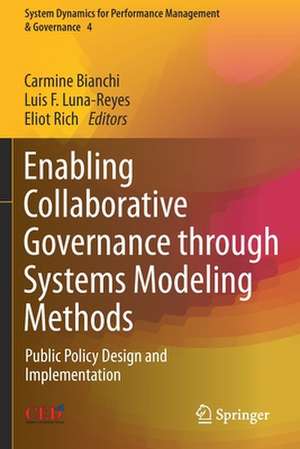Enabling Collaborative Governance through Systems Modeling Methods: Public Policy Design and Implementation: System Dynamics for Performance Management & Governance, cartea 4
Editat de Carmine Bianchi, Luis F. Luna-Reyes, Eliot Richen Limba Engleză Paperback – 9 iul 2021
| Toate formatele și edițiile | Preț | Express |
|---|---|---|
| Paperback (1) | 643.84 lei 6-8 săpt. | |
| Springer International Publishing – 9 iul 2021 | 643.84 lei 6-8 săpt. | |
| Hardback (1) | 650.19 lei 6-8 săpt. | |
| Springer International Publishing – 9 iul 2020 | 650.19 lei 6-8 săpt. |
Preț: 643.84 lei
Preț vechi: 757.46 lei
-15% Nou
Puncte Express: 966
Preț estimativ în valută:
123.21€ • 127.30$ • 102.49£
123.21€ • 127.30$ • 102.49£
Carte tipărită la comandă
Livrare economică 19 martie-02 aprilie
Preluare comenzi: 021 569.72.76
Specificații
ISBN-13: 9783030429720
ISBN-10: 3030429725
Ilustrații: XXVI, 340 p. 73 illus., 47 illus. in color.
Dimensiuni: 155 x 235 mm
Greutate: 0.51 kg
Ediția:1st ed. 2020
Editura: Springer International Publishing
Colecția Springer
Seria System Dynamics for Performance Management & Governance
Locul publicării:Cham, Switzerland
ISBN-10: 3030429725
Ilustrații: XXVI, 340 p. 73 illus., 47 illus. in color.
Dimensiuni: 155 x 235 mm
Greutate: 0.51 kg
Ediția:1st ed. 2020
Editura: Springer International Publishing
Colecția Springer
Seria System Dynamics for Performance Management & Governance
Locul publicării:Cham, Switzerland
Cuprins
Chapter 1. Applying Governing Networks & Multilevel Scales to Address Wicked Problems.- Chapter 2. Participative governance of the Swiss construction material industry – Transitioning business models and public policy.- Chapter 3. Leveraging collaborative governance: how co-production contributes to outcomes and public value in a small town.- Chapter 4. The Conceptual Dynamic Model of Rural Development Towards Sustainable Self Sufficiency.- Chapter 5. Policy Implementation: A review of selected literature.- Chapter 6. A Model-Based Governance and Planning Tool for HIV/AIDS Services in Vietnam.- Chapter 7. Collaboration governance and system dynamics modeling – what do clients want?.- Chapter 8. Multi-criteria policy options analysis of the Swedish environmental goals using indexed causal loop diagram modelling method.- Chapter 9. Participatory Multi-Criteria Evaluation of Metropolitan Transportation Planning System Scenarios: Navigating Trade-Offs for Collaborative Design of Sustainable Communities.- Chapter 10. Patronage and the Public Service: A Dynamic Performance Governance Perspective.- Chapter 11. Blending collaborative governance and dynamic performance management to foster policy coordination in renewable energy supply chains.- Chapter 12. Applying Dynamic Performance Management to Public Emergency Management: An Analysis of the Wenchuan Earthquake.- Chapter 13. Institutional logics analysis for enabling collaborative DPM processes: Universities’ third mission performance as an illustrative example.- Chapter 14. Fostering Collaborative Governance in Chronic Disease Management programs: a Dynamic Performance Management approach.- Chapter 15. Applying Dynamic Performance Management to Foster Collaborative Governance in Higher Education: A Conceptual Framework.
Notă biografică
Carmine Bianchi is Professor of Business & Public Management at the University of Palermo, Italy. He is the director of the Doctoral level program in “Model Based Public Planning, Policy Design, & Management,” and of the Master level program in Public Management. His research focuses on the design of policies and the outline of programs linking strategy and implementation. He has published in numerous academic and professional journals. He also serves on the Scientific Committee of various academic publications.
Luis Felipe Luna-Reyes is an Associate Professor in the University at Albany's Department of Public Administration, as well as the Ph.D. Program Director in Information Science. His research focuses on electronic government and on modeling collaboration processes in the development of information technologies across functional and organizational boundaries. His research interests are related to areas such as inter-organizational collaboration, information sharing, success of government-wide Web sites, and information policy to promote economic exchange in the NAFTA region.
Eliot Rich is an Associate Professor in the Department of Information Technology Management, School of Business, University at Albany. He researches simulation, software systems, knowledge management, information and infrastructure security. He studies organizational and individual behavior through the lens of system dynamics, a perspective that uses causal structures, feedback, and information delays to understand outcomes.
Luis Felipe Luna-Reyes is an Associate Professor in the University at Albany's Department of Public Administration, as well as the Ph.D. Program Director in Information Science. His research focuses on electronic government and on modeling collaboration processes in the development of information technologies across functional and organizational boundaries. His research interests are related to areas such as inter-organizational collaboration, information sharing, success of government-wide Web sites, and information policy to promote economic exchange in the NAFTA region.
Eliot Rich is an Associate Professor in the Department of Information Technology Management, School of Business, University at Albany. He researches simulation, software systems, knowledge management, information and infrastructure security. He studies organizational and individual behavior through the lens of system dynamics, a perspective that uses causal structures, feedback, and information delays to understand outcomes.
Textul de pe ultima copertă
This volume constitutes a first approximation for the use of systems approaches and dynamic performance management as tools for collaborative governance. The chapters examine models and simulations used in some specific systems approaches, which contribute to facilitating problem focus and collective understanding of collaborative governance, especially in the area of performance management. The explicit connection between resources and outcomes promoted by this view helps managers to understand better how to improve policy and to create positive outcomes that create public value.
Caracteristici
Presents different approaches to public management problem-solving that applies systemic principles, conceptual and simulation models Examines how public sector organizations are adopting system modeling methods Highlights the need to foster collaborative governance and the design of consistent and robust policies






